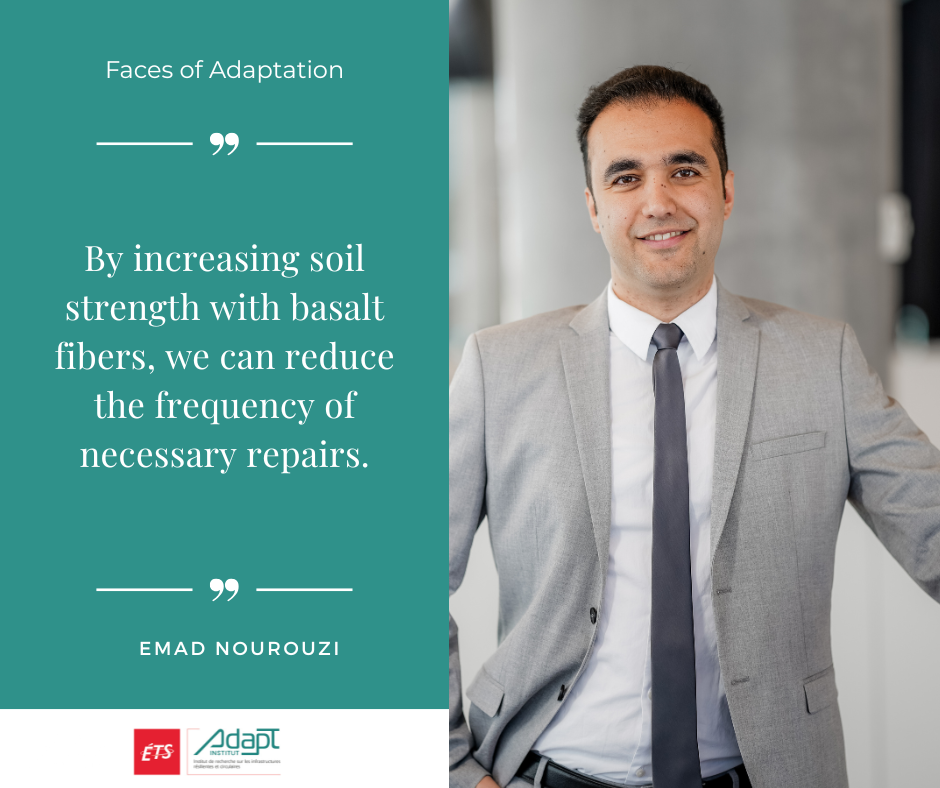For More Durable Roads

Emad Norouzi is a PhD student and researcher at Concordia University, specializing in geotechnical engineering. His research focuses on developing sustainable and environmentally friendly materials to reinforce road infrastructure and other constructions exposed to extreme climatic conditions.
Recently, Mr. Norouzi received a scholarship from AdapT – the Institute for Research on Resilient and Circular Infrastructure at ÉTS – supported by the Fonds de recherche du Québec and Mitacs. The goal of this scholarship is to promote innovative solutions for resilient and circular infrastructure. Here’s an overview of his research and how this scholarship will support it.
Could you present your research project?
We are working on new materials to add to the soil, particularly to increase its strength. More specifically, we are testing basalt fibers, which are highly environmentally friendly. We are trying to determine whether these fibers can strengthen the soil enough to be used in infrastructure such as pavements and roads, which could revolutionize road construction.
Why is your work important in the context of climate change?
We’ve all had bad experiences with Montreal and Quebec roadways — full of potholes and cracks caused by temperature fluctuations. These problems are worsened by the freeze–thaw cycles we endure each year. By increasing soil strength, we can reduce the frequency of necessary repairs, which is both economically beneficial and environmentally advantageous, as it reduces the resources needed for repairs. The materials we use must be both high-performing and environmentally safe. Previous materials were not always ecological and would often leach away after rain or snow. Basalt fibers, on the other hand, are durable and resistant to freeze–thaw cycles, making them a promising solution for sustainable infrastructure.
Why did you become interested in this issue?
Our group works in geotechnical engineering, and one of our biggest challenges is soil settlement. This can lead to ground sinking and significant damage to infrastructure. In Canada, especially in Quebec, we face freezing in winter and major soil settlement in summer, which causes a lot of trouble — especially for drivers. Damaged roads not only increase maintenance costs but also raise the risk of accidents. As engineers, we’re motivated by solving practical problems that have a direct impact on people’s daily lives. Moreover, the idea of using natural and sustainable materials like basalt fibers to tackle these issues is very inspiring. It allows us to contribute to both public safety and environmental protection.
What positive impacts could your research have for Quebec and Canada?
For Canada — and especially Quebec — we want to develop a highly resistant, affordable, and eco-friendly material blend. If we succeed, the benefits will be significant: more durable roads requiring fewer repairs, reducing costs for municipalities and disruptions for citizens. In addition, the use of basalt fibers, which are natural and abundant, will help reduce dependence on synthetic and potentially harmful materials. The numerical simulations we conduct help us optimize the proportion of each component in the blend to maximize strength while minimizing costs and environmental impacts. Ultimately, we hope our work can serve as a model for other parts of the world facing similar climatic conditions, contributing to more sustainable global development.
How will you use the scholarship received from ÉTS?
The scholarship will allow us to fund the many tests needed to achieve our results. More specifically, it will be used to purchase high-quality materials, conduct lab tests, and finance numerical simulations. These resources are essential to verify our assumptions and optimize the basalt fiber–soil mixture. Additionally, part of the funds will be allocated to sharing our findings through scientific publications and conferences, to communicate our discoveries to the scientific community and industry professionals. Ultimately, this scholarship is a crucial support for completing our research and contributing innovative, sustainable solutions for road infrastructure.
